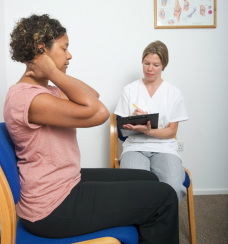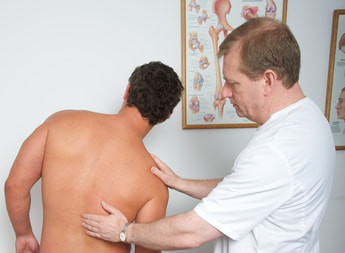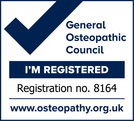What to expect when you see an osteopath
Before you visit an osteopath for the first time, you should check that they are registered with the General Osteopathic Council.
Illustrations: copyright of Kampfner Photography
Your first visit to an osteopath
Your first appointment will generally last about 1 hour. This time allows the osteopath to understand your problems, complete a comprehensive examination on you and determine an appropriate treatment. You can, of course, come with a friend or relative to help you feel comfortable, if you want.
Please bring with you: the list of any prescription medicine that you might be taking. Please also bring any results of recent investigations such as blood tests, X-rays, MRI scans or other. Do not worry if you don’t have them, but please bring them if you do.
Consultation: the osteopath will ask you questions about your general health, your symptoms and any other relevant information. The osteopath will be taking notes that will be recorded in your case notes. All information is treated, of course, confidentially.
Examination: in order to understand what is happening it is probable that the osteopath will ask you to take off some of your clothes. This typically means undressing down to your underwear. Please do not hesitate to tell your osteopath if you are in any way uncomfortable with this, we can find ways to work around it, so that you are completely at ease. You are also encouraged to bring with you stretchy shorts that you can change into, if you prefer. Please avoid jeans and other thick fabric.
Osteopaths generally need to see the spine to fully understand your posture and find any problematic spots.
Please bring with you: the list of any prescription medicine that you might be taking. Please also bring any results of recent investigations such as blood tests, X-rays, MRI scans or other. Do not worry if you don’t have them, but please bring them if you do.
Consultation: the osteopath will ask you questions about your general health, your symptoms and any other relevant information. The osteopath will be taking notes that will be recorded in your case notes. All information is treated, of course, confidentially.
Examination: in order to understand what is happening it is probable that the osteopath will ask you to take off some of your clothes. This typically means undressing down to your underwear. Please do not hesitate to tell your osteopath if you are in any way uncomfortable with this, we can find ways to work around it, so that you are completely at ease. You are also encouraged to bring with you stretchy shorts that you can change into, if you prefer. Please avoid jeans and other thick fabric.
Osteopaths generally need to see the spine to fully understand your posture and find any problematic spots.
.
Osteopaths ask you to stand and do some simple movements to assess your posture and mobility. Your osteopath will also use some manual techniques to evaluate your joints, your ligaments and your tissues. Osteopaths are highly trained to understand how your body is working both through sight and touch.
Your osteopath will then do a "hands-on" examination to determine the health of your joints, tissues and ligaments using their hands and a highly developed sense of touch called palpation. Osteopaths are trained to recognise signs of serious conditions that cannot be treated with osteopathy and may advise you to see your GP or go to hospital, if needed.
Your osteopath will then do a "hands-on" examination to determine the health of your joints, tissues and ligaments using their hands and a highly developed sense of touch called palpation. Osteopaths are trained to recognise signs of serious conditions that cannot be treated with osteopathy and may advise you to see your GP or go to hospital, if needed.
Diagnosis and treatment: your osteopath will explain to you what he or she believes to be the problem (their diagnosis) and how osteopathy can help. They will tell you clearly what benefits you should expect and whether there are any risks that you should consider. Following the diagnosis, the osteopath will start his treatment. This generally involves a skilled manipulation of the spine and joints and a massage of your soft tissues.
Throughout the treatment the osteopath will always explain what he is doing, why he is doing it and ask for your permission. Finally the osteopath will possibly recommend stretches or exercises that can help you in your recovery. Some of the suggestions might include changing how you sit at your desk, adjusting your car seat, changing your bed mattress. It is important that you follow your osteopath’s advice as what you do or don’t do outside the treatment room is actually key to your recovery. As part of your treatment plan, your osteopath might recommend more than one visit for ongoing treatment.
After your treatment: it is important to recognise that it is not unusual to feel sore in the 24-48 hours following your treatment. The treatment is physical in nature, so this is not unlike what happens when you have a tough session at the gym! Your osteopath will explain to you what you should expect and you should not hesitate to ask questions and/or give him a call if you are concerned.
Throughout the treatment the osteopath will always explain what he is doing, why he is doing it and ask for your permission. Finally the osteopath will possibly recommend stretches or exercises that can help you in your recovery. Some of the suggestions might include changing how you sit at your desk, adjusting your car seat, changing your bed mattress. It is important that you follow your osteopath’s advice as what you do or don’t do outside the treatment room is actually key to your recovery. As part of your treatment plan, your osteopath might recommend more than one visit for ongoing treatment.
After your treatment: it is important to recognise that it is not unusual to feel sore in the 24-48 hours following your treatment. The treatment is physical in nature, so this is not unlike what happens when you have a tough session at the gym! Your osteopath will explain to you what you should expect and you should not hesitate to ask questions and/or give him a call if you are concerned.
Source: General Osteopathic Council, http://www.osteopathy.org.uk
Alternatively, you can ring us on 07784861505 if you prefer to speak to a human being.





